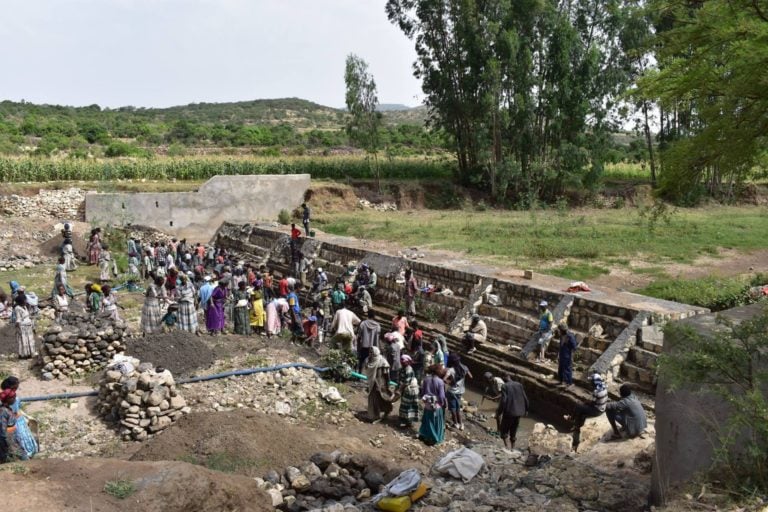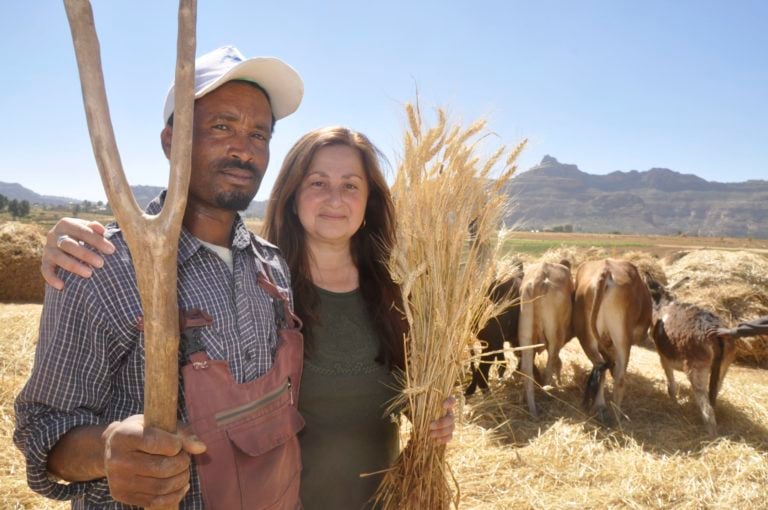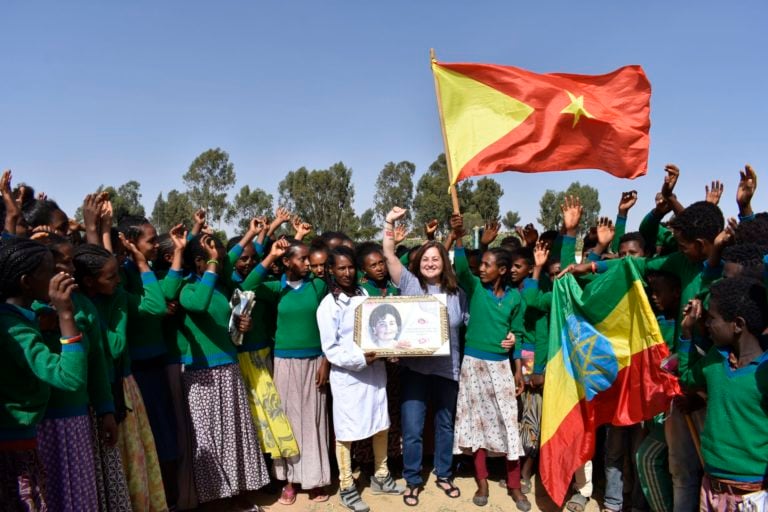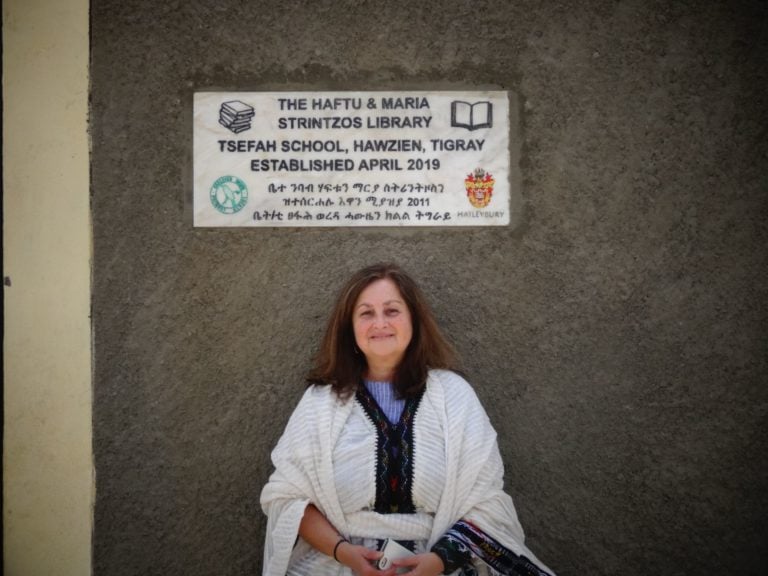If there could be a photo next to the definition of ‘humanism’ in the dictionary, it would be that of Maria Strintzos.
For 30 years, she has stood beside the vulnerable in Indonesia, Ethiopia, Sudan and Eritrea as well as disadvantaged women in Australia; those three decades have made her life’s work synonymous with the values of contribution and solidarity.
She grew up in North Melbourne and after completing her Bachelor and Master’s degree in Education – being the first scholar to examine the issue of Class, Gender and Ethnicity and school outcomes among Greek girls in Melbourne – she worked in a housing support service for women with mental health problems.
In 1988, she was the first Greek Australian to join the initiative Australian Volunteers Abroad, spending two years during President Suharto’s reign in Indonesia, developing programs to support disadvantaged women in the wider area.
She then started working at Community Aid Abroad, nowadays known as Oxfam Australia, heading the Horne of Africa operation, whilst managing humanitarian aid programs in Ethiopia, Sudan and Eritrea.
Seven years later, she joined the Relief Society of Tigray (REST); as the head of Fundraising and Public Relations, she has worked for the well-being and food security of four million of the poorest and hungriest women, men and children in the world.
In 2005, she also established the Hawzien Orphan Project, which has assisted hundreds of children, among them her adopted son Haftu, who became the Australian and Oceania U20 Cross Country Champion and the Australian 5km champion, and is now a student-athlete at Villanova University in Pennsylvania.
After 18 years in Addis Ababa, she returned to Melbourne in 2011. She is still working with REST, still supporting orphans and being an advocate for the development of Ethiopia.
Every year, she raises more than $US 50 million for the people of Tigray.
She has also been involved in the Philanthropic Society of Kaloneri, Kozani for close to 20 years, serving as its Secretary and first ever female President.
For her continuous humanitarian and philanthropic work, Maria was acknowledged by the Hellenic Australian Community of Chamber and Industry (HACCI) in November 2019, receiving the Community Service Award.
But who is Maria Strintzos and how does she manage to carry the weight of a troubled people on her shoulders for so many years? All this made me want to get to know her more, and honestly, our conversation was mind-blowing and dare I say life-changing.
Being around her changes your perspective; you have people like Maria on one hand and then there’s the rest of us.
A VALUABLE JOURNEY
Three decades of dedication and contribution, three decades besides Africa’s underprivileged.
She lived with them, joined their communities and became an integral part. She did not abandon them, not even in the midst of war, through gunshots and bombshells. When envoys and foreigners were running away from Ethiopia, Maria stayed and did what she does best: offering support, hope and fighting for a better future.
One might wonder, was it worth all the pain and suffering?
“Nearing 31 years of contribution [to those communities] I can say it was more than worth it,” Maria says and her voice livens up.
“It was an amazing journey during which I was able to change the lives of so many people, contributing to their well-being and becoming their voice. This is the most important takeaway, giving voice to millions of disadvantaged and vulnerable individuals that live on the margins and are not being heard by anyone. It is definitely worth it and I will continue to do so until I give up either physically or mentally. It is so satisfying and very fulfilling.”

Maria started a program for Ethiopia's orphans back in 2005. Photo: Supplied

Greek Australian volunteer Maria Strintzos inaugurated a library for the children of Tigray which was named after herself and her adopted son, Haftu. Photo: Supplied
EVERYTHING FOR TIGRAY
Maria initially joined REST as a volunteer during the region’s most turbulent times, in 1991. REST is an Ethiopian humanitarian organisation that started taking action against hunger, oppression and inequality in the late 1970s; the people of Tigray see REST as their saviour.
In 1999, she officially became the head of Fundraising and Public Relations at REST. Some of her responsibilities included raising funds from various donors, developing project ideas, preparing complex proposals, writing reports, keeping track of their funding base, liaising with donors, government and other NGO actors, representing the organisation at various levels, profiling and documenting REST’s work and advocacy on various issues.
READ: Memories of my childhood in Nigeria
“My work brief has always been varied, extensive, tough and very rewarding. It can take me up to two years to prepare a proposal. Our donors provide us with food and funds for developmental works. Outside of REST I also work individually to raise for Tigray,” said Maria, who manages to gather up to US $50 million in donations each year for her second home.
“It may seem like a lot of money, but considering we are dealing with millions of people who have huge needs when it comes to education, health, governance, access to water, agriculture, technology and so on, it really is not much,” she explains, stressing that REST is a pioneer in so many fields and continues to innovate and catalyse change in ways never seen before.

“It has achieved so much in transforming Tigray together with the people,” she says and her voice breaks. “Tigrayans earn every bit of help by working tirelessly and voluntarily in infrastructure projects. These are people that have experienced utmost suffering and yet they keep fighting. I will therefore do everything in my power to secure as many sources of income for them as I can.
“One needs to understand that REST is a small, local initiative that can hardly compete with giant organisations the likes of the United Nations and other NGOs that, naturally, get the lion’s cut when it comes to funding. A common misconception is that REST receives hefty amounts from the government or the The Tigray People’s Liberation Front (TPLF). In reality, REST has to fundraise and publicise its work on a local, national and international level all the while lacking the international influence and networks other organisations have access to.”
REST’s success in securing those funds lies in the transformative change and the results of its work that speak volumes. Its reputation and resilience precede it.
“We need to keep fighting to secure the funding.”
TIGRAY’S MOTHER
When Maria talks about fighting she means fighting. She lived in Tigray from 1991 till 2012. She is now permanently based in Melbourne but travels to Tigray often whenever needed for assessment and reports. She has no schedule; she works seven days a week and says she hasn’t had a holiday for more than 20 years.
It begs the question: where is Maria in all this?
She provides the answer herself; a disarming one.
“This isn’t work. This is my life. I can’t distinguish myself from these people. I feel I am part of their community. I share their pain when things are not good, for example when drought is upon Tigray or in times of conflict. My roots are there.”

This connection is not one-sided. In Maria, Tigrayans see one of them. She is their people. All doors are open for her. Everyone knows her by her first name.
“‘There’s Maria!’ they say when they see me. They call me ‘Mother of Tigray’. This is my reward,” she says moved.
“In the years that have passed I have seen communities change, evolve. Houses and schools built, great infrastructure works… and I think to myself: If I can contribute to this change, how can I refuse?”
THE REWARD
It goes without saying that she has never refused to help, on the contrary, she has dedicated her entire life to what one might call a god forsaken place.
“These people, the orphans, rely on me. There are children with AIDS and chronic illnesses without parents and no support network. About four to five of them are now in uni,” she says with pride.
READ: Orthodox church in Zimbabwe keeps flame alive with Greek community support
For Maria, this is the reward. And a much greater and precious reward, she confesses, is her son.
“Had I not been involved with Tigray and started the social program that coordinates and monitors the daily lives of orphans with my mother who helped me raise the money, I would not have my son. He is the most precious thing I have in my life. His name is Haftu, which means ‘my wealth’.”
A VICIOUS CIRCLE
For as long as Maria and I were talking about the troubled people of Africa and her humanitarian work, a question was boggling me. Will the world ever stop being divided?
“I don’t think so,” she replies. “There are too many vested interests and Ethiopia hold a key position. All the natural sources of the Nile are there, yet people struggle for access to water. They need them to be enslaved and they will remain slaves due to the internal turmoil and lack of education that external forces and people in power are taking advantage of.”
That is where REST and Maria come in, in an attempt to bring about change in these people’s lives turning the situation on its head. They are fuelled by and with hope to offer as many opportunities to those underprivileged children as possible, however, “hope alone is not enough to turn the sun”, Maria says.
“When I started the library in Tigray, I heard one child say to another: ‘Now that there are books, I will be a doctor’. This is all new to these kids. For the first time, they feel they stand a chance. That new horizons of opportunity are being opened and their souls are filled with hope. At the same time, though, I can’t help but wonder what chances they really stand in the modern world without electricity, having not ever seen a computer? And it hurts me to know that even if they do go to university, if they choose to return, there are no jobs and they will have no other choice but to become farmers. It’s a vicious circle”.

RECOGNITION FROM THE COMMUNITY
The realisation of all these adversities does not slow Maria down. On the contrary, she becomes feistier and even more determined to fight harder and break this cycle of injustice. Her journey is lonely and hard.
In all the years she has worked for the people of Tigrei she has held a low profile and in spite of her many social, financial and political significant wins that have changed the lives of many, she never claimed praise.
Her work has always been for the people of Ethiopia and never a means to self-promotion, which is why the HACCI award came as a surprise.
When she first received the news she thought that one of the grants she expected had been denied. Upon realising she was to be awarded by the Greek Community Maria burst into tears.
“My tears came from realising that my efforts were seen and acknowledged by the Greek Australian community, my community. Finally, my work was being recognised which also meant that the voices of the poor were finally being heard. By honouring me, HACCI provided the spotlight for all these people to be recognised and honoured as well.”
Maria says this has been the most significant accolade she has received; the HACCI award has marked the end of yet another circle.
“All the great core values that determined my life stance and my trajectory I owe to my Greek heritage. Social justice, humanism, honour and of course filotimo are ideals I was raised with by my parents. Had I not been brought up Greek and had I not experienced all the difficulties and challenges of the 1960s firsthand, I would not be the Maria I am today. With this award from HACCI that represents my community, I feel that a circle of life has been completed.”
ABOUT LEGACY
‘Mother of Tigray’, humanitarian, citizen of the world, social warrior and all-round figter. One can choose many titles for Maria Strintzos, all fitting yet not enough. She, however, humbly rejects them all, raising the argument that she knows for a fact that there are people out there who actually deserve them.
Her only wish is to leave her mark in this world as someone that loves Tigray and contributed to the people’s movement for liberation from ignorance and servitude. Someone that has fought to change the lives of its people; someone that has helped to bring hope and prosperity to those who were born on the dark side of the sun.
READ: Greek Australian volunteer Jane Pallot in Sierra Leone: ‘We need to look beyond our own borders’